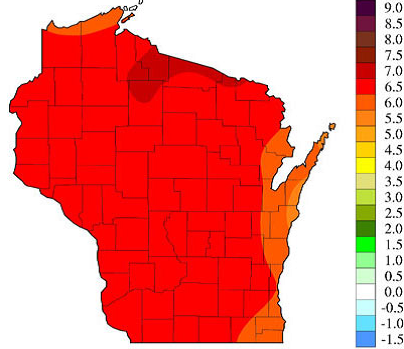State Plans For Climate Change
Even as DNR backs away, Emergency Management releases climate change strategy.

Climate change will make Wisconsin hotter and more prone to natural disasters. Source: Wisconsin Initiative on Climate Change Impacts, 2011
Wisconsin has earned a reputation for eschewing climate science and the potential impacts of climate change under Governor Scott Walker’s administration. But a plan finalized by the state’s Emergency Management agency in December and released last week is pleasantly out of step with that pattern. The agency published its newly approved state disaster preparedness plan (also known as a hazard mitigation plan) that takes a clear-eyed look at the risks the state faces as floods, droughts, and forest fires become more frequent and more destructive.
Far from shying away from climate change, as other state agencies have reportedly done (follow these links for more on Wisconsin DNR and the state’s Public Service Commission), Wisconsin’s State Hazard Mitigation Plan details how climate change affects the state’s susceptibility to natural disasters. Not only that, the plan also commits to taking actions that could help address the impacts of climate change, if not the underlying causes (which isn’t Emergency Management’s purview, Wisconsin DNR oversees those efforts).
The state’s updated plan is an important step forward because the analysis Wisconsin Emergency Management has done and the actions they plan to take will help keep people and property safer in the future.
Not only did the agency give a fairly detailed accounting of the potential impacts of climate change, it also committed, as part of the updated plan, to prioritize actions that help communities decrease their vulnerability to these future climate-induced disasters, including some ideas of NRDC’s:
- Incorporating climate resilient mitigation projects into the prioritization for state funding
- Considering climate change impacts in other policies, decisions, and plans
- Factoring in actions communities are already taking to reduce flood risk (like through FEMA’s Community Rating System)
The agency’s commitment to prioritizing funding for projects that account for future climate change risks, in addition to today’s risks, is a smart move. For example, a community may want to buy out repeatedly flooded properties, which would be a good investment. But an even smarter and safer investment would include a buyout of properties made vulnerable to flooding in the future from increasingly extreme weather. Or the community could do additional work to restore natural floodplain features on the acquired properties, like wetlands, that would help further reduce flood risk. Thanks to the changes Wisconsin made in this plan, these kinds of forward-thinking projects may be able to receive funding.
Investing in long-term resilience is not only scientifically sound, it also makes economic sense. The Federal Emergency Management Agency (FEMA) has found that every dollar spent on avoiding future damages returns four dollars in benefits and avoided losses. Wisconsin’s plan is also one of the first to comply with new guidelines from the FEMA requiring states to assess how climate change may increase the likelihood of natural disasters and their capacity to cause damage, as well evaluate what actions the state could take to reduce its vulnerability.
This step forward is encouraging to see, given that other agencies in Wisconsin have begun to de-emphasize climate science during Governor Walker’s administration. We applaud Wisconsin Emergency Management for releasing a plan that acknowledges the effects of climate change and proposes sound recommendations to better safeguard our communities. We hope other states will follow suit.
Rob Moore, Senior Policy Analyst, Water Program at the Natural Resources Defense Council.
















I don’t think truth in climate change is limited to Emergency Management. Saw this story on how dpi is also stepping in to pick up the slack:
http://www.wisconsinrapidstribune.com/story/news/local/2017/01/09/state-sites-still-teach-climate-change/96150006/